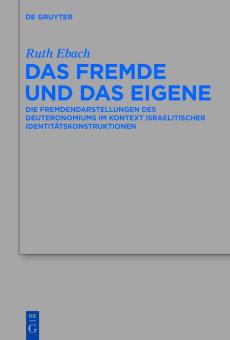The others and the self
Protestan theologian Ebach examines representations of foreigners in the Book of Deuteronomy

Based on the sociological theory that descriptions of the “other(s)” and the “self” are correlated and situational parts of construction processes, the study examines the narrative and legal texts of the biblical Book of Deuteronomy, which regulate and arrange Israel’s contact with foreign peoples, gods and (ritual) practices. It shows a wide range from the command to love the resident alien (Deut 10:19) to the request of a radical annihilation in the form of the ban regarding the Canaanite peoples (Deut 7). By combining literary historical analysis and sociological insights, the study shows that the categorization of persons (Deut 7 et al.) and practices (Deut 18) as foreign or alien is frequently a result of an active attribution. The monograph traces the Deuteronomy’s literary layers in pre-exilic, exilic and post-exilic times linking the various attributions and evaluations with the different authors’ historical and social settings. It becomes clear that, in particular, harsh demarcations are drawn when one's own identity is questioned by crises.
Literature: Ebach, Ruth, Das Fremde und das Eigene. Die Fremdendarstellungen des Deuteronomiums im Kontext israelitischer Identitätskonstruktionen (Beihefte zur Zeitschrift für die alttestamentliche Wissenschaft, vol. 471), Berlin et al.: De Gruyter 2014.

